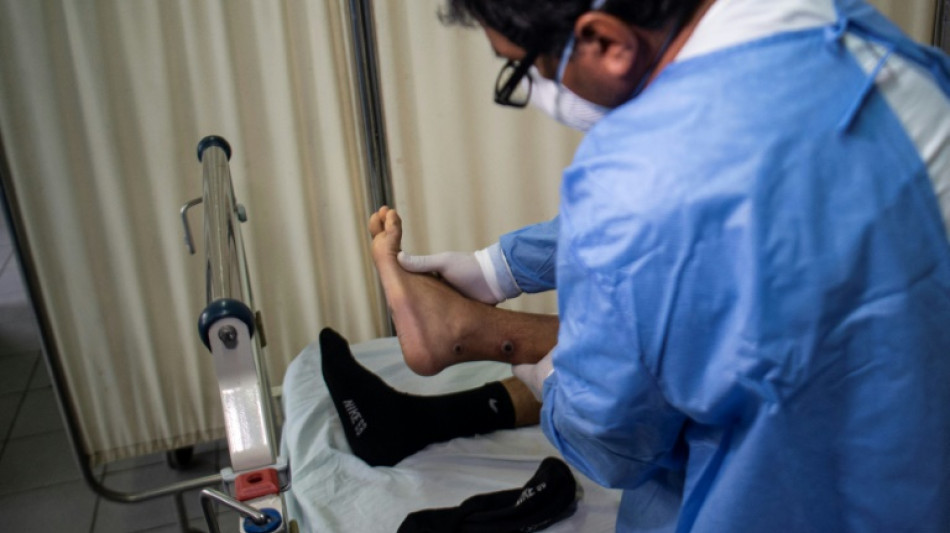
-
 Sarr strikes as Palace end winless run at Brighton
Sarr strikes as Palace end winless run at Brighton
-
Olympic star Ledecka says athletes ignored in debate over future of snowboard event

-
 Auger-Aliassime retains Montpellier Open crown
Auger-Aliassime retains Montpellier Open crown
-
Lindsey Vonn, skiing's iron lady whose Olympic dream ended in tears

-
 Conservative Thai PM claims election victory
Conservative Thai PM claims election victory
-
Kamindu fireworks rescue Sri Lanka to 163-6 against Ireland

-
 UK PM's top aide quits in scandal over Mandelson links to Epstein
UK PM's top aide quits in scandal over Mandelson links to Epstein
-
Reed continues Gulf romp with victory in Qatar

-
 Conservative Thai PM heading for election victory: projections
Conservative Thai PM heading for election victory: projections
-
Heartache for Olympic downhill champion Johnson after Vonn's crash

-
 Takaichi on course for landslide win in Japan election
Takaichi on course for landslide win in Japan election
-
Wales coach Tandy will avoid 'knee-jerk' reaction to crushing England loss

-
 Sanae Takaichi, Japan's triumphant first woman PM
Sanae Takaichi, Japan's triumphant first woman PM
-
England avoid seismic shock by beating Nepal in last-ball thriller

-
 Karl defends Olympic men's parallel giant slalom crown
Karl defends Olympic men's parallel giant slalom crown
-
Colour and caution as banned kite-flying festival returns to Pakistan

-
 England cling on to beat Nepal in last-ball thriller
England cling on to beat Nepal in last-ball thriller
-
UK foreign office to review pay-off to Epstein-linked US envoy

-
 England's Arundell eager to learn from Springbok star Kolbe
England's Arundell eager to learn from Springbok star Kolbe
-
Czech snowboard great Ledecka fails in bid for third straight Olympic gold

-
 Expectation, then stunned silence as Vonn crashes out of Olympics
Expectation, then stunned silence as Vonn crashes out of Olympics
-
Storm-battered Portugal votes in presidential election run-off

-
 Breezy Johnson wins Olympic downhill gold, Vonn crashes out
Breezy Johnson wins Olympic downhill gold, Vonn crashes out
-
Vonn's Olympic dream cut short by downhill crash

-
 French police arrest five over crypto-linked magistrate kidnapping
French police arrest five over crypto-linked magistrate kidnapping
-
Late Jacks flurry propels England to 184-7 against Nepal

-
 Vonn crashes out of Winter Olympics, ending medal dream
Vonn crashes out of Winter Olympics, ending medal dream
-
All-new Ioniq 3 coming in 2026

-
 New Twingo e-tech is at the starting line
New Twingo e-tech is at the starting line
-
New Ypsilon and Ypsilon hf

-
 The Cupra Raval will be launched in 2026
The Cupra Raval will be launched in 2026
-
New id.Polo comes electric

-
 Iran defies US threats to insist on right to enrich uranium
Iran defies US threats to insist on right to enrich uranium
-
Seifert powers New Zealand to their record T20 World Cup chase

-
 Naib's fifty lifts Afghanistan to 182-6 against New Zealand
Naib's fifty lifts Afghanistan to 182-6 against New Zealand
-
Paul Thomas Anderson wins top director prize for 'One Battle After Another'

-
 De Beers sale drags in diamond doldrums
De Beers sale drags in diamond doldrums
-
NFL embraces fashion as league seeks new audiences

-
 What's at stake for Indian agriculture in Trump's trade deal?
What's at stake for Indian agriculture in Trump's trade deal?
-
Real Madrid can wait - Siraj's dream night after late T20 call-up

-
 Castle's monster night fuels Spurs, Rockets rally to beat Thunder
Castle's monster night fuels Spurs, Rockets rally to beat Thunder
-
Japan votes in snow-hit snap polls as Takaichi eyes strong mandate

-
 Pakistan's capital picks concrete over trees, angering residents
Pakistan's capital picks concrete over trees, angering residents
-
Berlin's crumbling 'Russian houses' trapped in bureaucratic limbo

-
 Neglected killer: kala-azar disease surges in Kenya
Neglected killer: kala-azar disease surges in Kenya
-
Super Bowl set for Patriots-Seahawks showdown as politics swirl

-
 Sengun shines as Rockets rally to beat NBA champion Thunder
Sengun shines as Rockets rally to beat NBA champion Thunder
-
Matsuyama grabs PGA Phoenix Open lead with Hisatsune one back

-
 How Dental Implants Can Improve Your Quality of Life in Bonita Springs
How Dental Implants Can Improve Your Quality of Life in Bonita Springs
-
Washington Post CEO out after sweeping job cuts


WHO urges caution after dog catches monkeypox
The World Health Organization called Wednesday for people infected with monkeypox to avoid exposing animals to the virus following a first reported case of human-to-dog transmission.
A first case of human-to-dog transmission of monkeypox -- between two men and their Italian greyhound living together in Paris -- was reported last week in the medical journal The Lancet.
"This is the first case reported of human-to-animal transmission... and we believe it is the first instance of a canine being infected," Rosamund Lewis, the WHO's technical lead for monkeypox, told reporters.
Experts had been aware of the theoretical risk that such a jump could happen, she said, adding that public health agencies had already been advising those suffering from the disease to "isolate from their pets".
She also said "waste management is critical" to lowering the risk of contaminating rodents and other animals outside the household.
- Species barrier -
When viruses jump the species barrier it often sparks concern that they could mutate dangerously.
Lewis stressed that so far there were no reports that was happening with monkeypox.
But she acknowledged that "as soon as the virus moves into a different setting in a different population, there is obviously a possibility that it will develop differently and mutate differently".
The main concern revolves around animals outside of the household.
"The more dangerous situation... is where a virus can move into a small mammal population with high density of animals," WHO emergencies director Michael Ryan told reporters.
"It is through the process of one animal infecting the next and the next and the next that you see rapid evolution of the virus."
He stressed though that there was little cause for concern around household pets.
"I don't expect the virus to evolve any more quickly in one single dog than in one single human," he said, adding that while "we need to remain vigilant... pets are not a risk."
Monkeypox was originally identified in monkeys kept for research in Denmark in 1958, though it is found most frequently in rodents.
The disease was first discovered in humans in 1970, with the spread since then mainly limited to certain West and Central African countries.
But in May, cases of the disease, which causes fever, muscular aches and large boil-like skin lesions, began spreading rapidly around the world, mainly among men who have sex with men.
Worldwide, more than 35,000 cases have been confirmed since the start of the year in 92 countries, and 12 people have died, according to the WHO, which has designated the outbreak a global health emergency.
- 'Not a silver bullet' -
With global case numbers jumping by 20 percent in the past week alone, the UN health agency is urging all countries to do more to rein in the spread, including ensuring at-risk populations have access to services and information about the dangers and how to protect themselves.
There is also a vaccine, originally developed for smallpox, but it is in short supply.
Lewis also stressed that there was still little data on the effectiveness of the vaccine in protecting against monkeypox in the current outbreak.
While no randomised control trials had been conducted yet, she said there were reports of breakthrough cases following vaccination, indicating "the vaccine is not 100 percent".
Pointing to limited studies in the 1980s suggesting that the smallpox vaccines used at the time might offer 85-percent protection against monkeypox, she said the breakthrough cases were "not really a surprise".
"But it reminds us that the vaccine is not a silver bullet," she said.
P.M.Smith--AMWN


